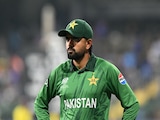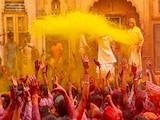Prime Minister Narendra Modi, in his Independence Day speech on Tuesday, presented the demography of the country as its biggest strength, and said the time was ripe to embrace "development centred around values" to make India a developed country by 2047.
The speech was both a message to the international community ahead of the G-20 leaders summit to be hosted by India next month and also an outreach to different social groups in the run-up to the big 2024 polls.
The PM focused extensively on igniting "Rashtra chetna" (national consciousness) and "Rashtra charitra" (National character), and both being aimed at vishwakalyan (national good). The PM mentioned the violence in Manipur and said the nation was with the state and the victims, specifically women. This is a critical reference as the opposition has been accusing the PM of ignoring Manipur.
A significant focus of the PM's speech this time was also environment, as he recalled the lives lost due to natural disasters this year - there have been floods, landslides in many states including Uttarakhand and Himachal Pradesh. He also spoke about his government's efforts to build disaster-resilient infrastructure and strengthening relief efforts.
He said it was India that pushed for "One Earth, One Family and One Future" theme at G-20, and Lifestyle for Environment.
The PM praised bureaucracy, which played an important role in the last nine years in implementing actions to fulfil his government's vision, aanganwadi and Asha workers giving them credit for vaccinations and also thanked the Supreme court in supporting the government's push for regional languages.
The praise for bureaucracy and the Supreme Court is particularly interesting as the former is considered vital for the PM's style of functioning with emphasis on administrative control -- many of his ministers have been efficient former bureaucrats. The government and the judiciary's relationship have had its disagreements.
Recurring themes of the PM's speech were naarishakti (women power), samajik nyay (social justice), yuva shakti (youth power), pariwarvaad (dynastry-led politics), brashtachar (corruption), tushtikaran (appeasement), the use of adhunikta (modernity - in terms of use of technology and infrastructure) was striking, as he used it repeatedly to present his governance model that was a confluence of traditional values and modernity. "We are making strides in nano technology, but we are also working to increase organic farming," he said.
"Demography as a strength"
The Prime Minister's mentioned that "we are young at a time when some other countries are struggling with ageing populations," an important statement as India has emerged as the most populous country in the world, surpassing China. With a population of approximately 142.86 crore, India now exceeds China's population by roughly 29,56311 lakh and is the most populous country in the world.
According to data, India has the world's largest youth population, with over 908 million people under the age of 35. This represents 66% of India's total population. In the 15-24 age group, India has the highest youth population in the world, with over 255 million people.
Having the largest youth population comes with a set of challenges, as the government will have to ensure their education, skilling jobs and health.
A new world order and the power of India's small towns
The PM kept the upcoming G20 meeting at the center of his speech, and said the country has a wonderful opportunity to make a mark. After Covid-19 crisis, a new world order has emerged and Indians are playing an important role in shaping the changing dynamics. The world no longer has "ifs and buts" about India because it has seen the country's commitment in the last few years, and was showing faith in it.
In this context he said India will also have to ensure there is no compromise on quality when it comes to "Make in India" products, as it was important to set an example for others and stay true to it. "When they see a make in India product, they should have no doubts on its quality," the PM said. He recalled how world leaders at the G-20 meeting in Bali were interested in knowing how India's digital India programmes have been able to create an impact.
A highlight of the speech was the PM's emphasis on India's tier-2 and tier-3 cities. "The aspirations and potential of small towns in India are high... and I want to tell them they will not feel the shortage of opportunities they need to grow," he said.
New announcements centred around social Justice, women rights
The PM's thrust on social justice offers a clear hint of the importance of social engineering in the BJP's campaign in the run-up to 2024.
In a major outreach to the OBC communities that form about 40 percent of the country's electorate, the PM announced that the Vishwakarma yojna that will be rolled out on September 17 will assist barbers, tanners, blacksmiths and others.
This programme was announced in the budget, and will specifically help artisans, craftsmen and workers in traditional work to be part of the domestic and global supply chains. The scheme will also counter moves made by various state governments to push OBC welfare, such as Bihar's caste census, Samajwadi Party's increasing representation of OBCs in its party ranks, Rajasthan government's move to raise OBC reservation from 21% to 27%, among others.
The PM, who comes from an OBC background, last year made it a point to celebrate the Vishwakarma Jayanti with students of ITI. He said the number of Jan Aushadhi kendras that offer medicines at subsidised rates will go up from 10,000 to 50,000 that will help senior citizens and poor households.
The announcement to create 2 crore lakhpati didis in villages, mention of women getting into STEM (Science, technology, engineering, and mathematics), training to 15,000 women self-help groups to operate and repair drones for agri-tech purposes was driven towards reaching out to women, a key group of the electorate the PM has been investing in.
A sense of security
The PM touched upon the issue of security in his speech, and said modernising the armed forces has paved the way for better security for its citizens. The number of terrorist activities and Maoist attacks have significantly reduced, he said. "Now, you don't see suspicious bags that could scare people...citizens have a feeling of security now."
The PM also addressed the issue of inflation and increasing prices of essentials, a topic of concern in the country and said the government will try its best to address it. Both these concerns are important, as while national security is a strength of the Modi government, concerns over price rise had left the government on the defensive, particularly on its move to reach out to the poor.
Despite welfare schemes, questions on increasing prices, particularly of tomatoes were being asked of the government, and this was the PM's attempt to provide some assurance.
Centre-state politics
The PM said his government gave Rs 100 Lakh crore to states in the last five years, as opposed to earlier governments that gave Rs 30 Lakh crore to them. Regional aspirations, he said, have to be understood and strengthened, and every state should be given adequate opportunities. Allocations for houses for the poor, urea subsidy for farmers, Mudra loans and assistance to MSME has grown significantly in the last ten years, as the centre was invested in the nation's overall growth, he claimed.
North-South divide, Centre-State relationship, federalism have become a point of contention between opposition parties and the BJP. Parties such as DMK, Trinamool have been particularly agitating against the Centre for depriving them of central funds. With parties such as the DMK and Congress that have stressed on India being a union of States, it is also an ideological issue for the BJP that has stressed on the civilisational unity of the nation.
The PM said it was important to think of the country as one, at all times, as an event in one state has an impact on others. "The pain of Manipur was felt even in Maharashtra...We are one. Bharat has to be a model of diversity," he said, in a message, particularly to the States.
Domestic Politics
Continuing his attack on the opposition, the PM again said corruption, dynasty-led politics and appeasement are the biggest stumbling blocks to democracy. "They crush merit and rights of people, and should be fought tooth and nail," he said, pointing out that dynasty-led politics goes against the concept of "sarvajan hitay sarvajan sukhay," also a slogan used by bahujan parties such as BSP to talk about the rights of the most deprived communities.
He said his government has seized 20 times more property of corrupt. "It is understandable why some people are angry with me...We don't take action for the camera. We file chargesheets, we fight the cases in courts to ensure the corrupt are punished. And my fight against the corrupt will continue," the PM said.
Many opposition leaders are facing the scrutiny of investigating agencies, and have made this a political flashpoint. The PM in his speech said he was voted because people had faith in him, and through his performance, he has converted "vaada into vishwas" (hope to confidence). "You formed the government and that gave me the courage to reform," he told people.
He ended the speech with a note of confidence that next year on I-Day he will return as the PM. "This is a government that works. This is an India that is full of self confidence, that doesn't stop, tire or lose," he said.
This call, a reminder of his battle cry in 2019, "Naamdaar versus kaamdar" political narrative is likely to be at the centre of the BJP's campaign for 2024.















